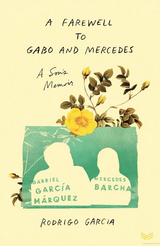I am politically pro-choice, but personally pro-life. I have my faith but refuse to force it on the world at large—especially this world, so brutal and unjust. I cannot make these wrenching personal life and death decisions for others—nor do I believe they should be made by a church run by childless men. |
|
TOMORROW: My Book World | Ellis Amburn's Subterranean Kerouac
0 Comments
FRIDAY: My Book World | Amburn Ellis's Subterranean Kerouac
FRIDAY: My Book World | Amburn Ellis's Subterranean Kerouac
My Book World García, Rodrigo. A Farewell to Gabo and Mercedes: A Son’s Memoir of Gabriel García Márquez. New York: HarperVia, 2021. The son of Gabriel García Márquez writes a brief but compelling remembrance of his famous father and formidable mother. Each of the five parts begins with a brief epigraph from one of Márquez’s works. North American culture has so much to learn from our friends in South America whose profound sense of family—in spite of its many complexities—outshines our own. I found myself envying the relationship that Rodrigo has with his parents, his brother, his own children and his nieces and nephews, aunts and uncles, grandparents long gone but whose influence seems eternal—no wonder Márquez could write a book as profound as One Hundred Years of Solitude. He needed only comb his own ancestry for his complete cast of characters. I envision myself reading this book again and again. NEXT FRIDAY: My Book World | Amburn Ellis's Subterranean Kerouac.
FRIDAY: My Book World | Rodrigo García's A Farewell to Gabo and Mercedes: A Son's Memoir of Gabriel García Márquez
FRIDAY: My Book World | Rodrigo García's A Farewell to Gabo and Mercedes: A Son's Memoir of Gabriel García Márquez
FRIDAY: My Book World | Rodrigo García's A Farewell to Gabo and Mercedes: A Son's Memoir of Gabriel García Márquez
My Book World Arenas, Reinaldo. The Doorman. Translated by Dolores M. Koch. New York: Grove, 1991 (1987). The more I read of Arenas’s work the more I am charmed by a skilled writer’s use of magical realism. In this instance, Juan, a young Cuban immigrant is hired as doorman by a fairly exclusive residential hotel in New York City. He does his very best to learn the names of all the occupants and their quirks and preferences. He fetches and messages for them. He does his best to learn the names of all their pets as well, a veritable Noah’s Ark from the tiniest to the largest. This odd point is where one begins to sense the leap readers are to make, from reality to magic. The animals begin to speak to Juan in “human language,” and at first that seems fine with Juan. But then the situation evolves into something more complicated (no spoilers). Juan is on a spiritual journey to locate a “door” that will lead him and everyone who wants into a better world. Arenas is skilled in dragging along even the most skeptical of us because he has a larger point to make. NEXT FRIDAY: My Book World | Rodrigo García's A Farewell to Gabo and Mercedes: A Son’s Memoir of Gabriel García Márquez
TOMORROW: My Book World | R. Arenas's The Doorman
FRIDAY: My Book World | Reinaldo Arenas's The Doorman
FRIDAY: My Book World | Reinaldo Arenas's The Doorman
My Book World Leonnig, Carol. Zero Fail: The Rise and Fall of the Secret Service. New York: Random, 2021. This book is one of the most fascinating contemporary reads to emerge in a long time. Leonnig, a distinguished Washington Post reporter, delves into the 155-year history of the United States Secret Service—the agency designed primarily to keep the president and family safe. She brings to light its early history: Within a period of thirty-six years, the U.S. experiences three presidential assassinations. Lincoln. Garfield. McKinley. Following Lincoln’s death, the Service is established with minimal or feeble funding. After the third assassination, the congress still refuses to provide additional protection, not wanting the president to be treated like royalty. When Kennedy is assassinated, the congress ultimately realizes it must provide more resources for the Secret Service. And presidents must adjust their thinking. Kennedy may, in part, have contributed to his own death by not adhering to the Service’s request that he not get as close to crowds as he liked. And also by not riding in an open car and by not allowing agents to stand on the rear bumper of his limo. Leonnig explores subsequent presidencies to inform readers in great detail about each administration since: Ford’s two close calls. Reagan’s near-death attack. How the Service erodes during Bush’s and Clinton’s administrations. How the Service is pushed beyond its capabilities during Obama’s era when threats and attempts on him rise exponentially and when two different “jumpers” leap over the White House fence, one of them actually coming within feet of the Obama family’s living quarters. The author informs us of the unrest within the Service: the frequent change of leadership, the history of good old boy networks that reward relationships instead of meritorious service. She tells of the scandals that rock the service, including details of the one in Cartagena where at least ten agents become extremely drunk and involve themselves with prostitutes. Her conclusion: many problems still exist. The agency needs a complete restructuring, much more funding, and a coordinated effort to heartily renew its mission of always putting the lives of the president and family and other figures ahead of lives of agents sworn to protect them. Until these things occur, the Secret Service will remain stretched beyond its capabilities and perhaps remain a second-rate organization. NEXT FRIDAY: My Book World | Reinaldo Arenas's The Doorman
TOMORROW: My Book World | Carol Leonnig's Zero Fail
FRIDAY: My Book World | Carol Leonnig's Zero Fail
FRIDAY: My Book World | Carol Leonnig's Zero Fail
My Book World Brottman, Mikita. Couple Found Slain: After a Family Murder. New York: Holt, 2021. This true crime book prides itself in presenting a story that is different from others about murder within a family, and I do believe it is an interesting approach. Brottman offers only a few chapters about the dysfunctional family of a young man who murders his parents and the circumstances that may lead him to do such a thing. The rest of the book concerns itself with the young man’s incarceration in the state of Maryland’s mental health and legal systems. Young Brian Bechtold, once he realizes the severity of what he has done, turns himself in to the police. He expects he will go to prison, because, of course, he has committed murder. Instead, to this day, over fifty years of age, Brian remains a resident of Clifton T. Perkins Hospital Center. His story is one of abuse by psychiatrists, other patients, and a legal system that does not give healthy support to people with mental problems. If only he were in prison, he would have far more freedom, including the freedom to rehabilitate, serve his time, and get out. But at Perkins he has become a lifer, and oddly, he may be saner than one or two of the professionals who “treat” him. Brottman’s prose is unrelentingly dead, a just-the-facts-ma’am kind of journalism, but perhaps that is what true fans of true crime expect. NEXT FRIDAY: My Book World | Reinaldo Arenas's The Doorman
TOMORROW: My Book World | M. Brottman's Couple Found Slain
FRIDAY: My Book World | Mikita Brottman's Couple Found Slain
|
AUTHOR
Richard Jespers is a writer living in Lubbock, Texas, USA. See my profile at Author Central:
http://amazon.com/author/rjespers Archives
June 2024
Categories
All
Blogroll
Websites
|























 RSS Feed
RSS Feed